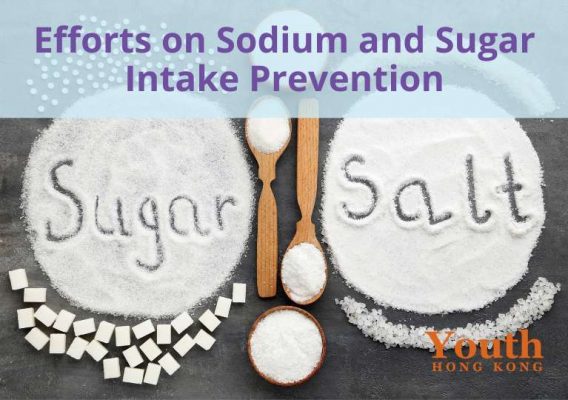//vol.15-1 Special Focus
As reported by the World Health Organisation (WHO), non-communicable diseases (NCDs) kill 41 million people each year, which is equivalent to 71% o all deaths globally1. 20% of most deaths are attributed to food-related causes, where the dietary preferences include foods with excessive salt and sugar levels. What are some of the global preventive measures? How is Hong Kong tackling this growing health focus?
Excessive dietary sodium and sugar intakes are closely related to health, and in particular, the association with non-communicable diseases (NCDs) such as hypertension, cardiovascular diseases, stroke, and coronary heart attack, while excessive consumption of sugar would increase the risk of obesity, diabetes, tooth decay as well as cardiometabolic risk.
In Hong Kong, people aged 15-84 years old usually consume 8.8 grams of salt daily, which is slightly higher than the recommended level for adults by the World Health Organisation (5 grams of salt or slightly less than one level teaspoon of salt). The mean daily intake of total sugar among local adults was 53 grams per day, slightly higher than the WHO’S recommended level of 50 grams daily2.
Current Chairman of the Committee on Reduction of Salt and Sugar in Food (「CRSS」) Mr. Chueng Leong explained that it is precisely so that the CRSS was set up in March 2015 to advise the Secretary for Food and Health on the formulation of policy directions and work plans related to the reduction on the intake of salt and sugar by the public. Collectively, they hope their efforts will help to encourage behavioural change, and instilling prevention and the control of NCDs in the city by the year 2025. Much has been done to date, since their establishment in 2015:
- the Salt Reduction Scheme for School Lunches to reduce the average sodium level of primary school lunches to not more than 500 milligrams. 13 lunch suppliers participated in the Scheme with sodium-reduced lunch options for 80% of all primary schools in Hong Kong.
- the 「Healthy Drinks at School」 Charter to reduce the intake of excessive sugar from drinks for preschool students. About 45% of all kindergartens and childcare centres had participated in this programme.
- the Less-salt-and-sugar Restaurants Scheme encourages restaurants to provide customers with food options of reduced salt and/or sugar or tailor-made less-salt-and-sugar dishes. Some 1,100 restaurants have come on board.
- the 「Salt/Sugar」 Label Scheme for Prepackaged Food Products to help consumers easily identify prepackaged food products that meet the legal definitions of 「low salt」, 「no salt」, 「low sugar」 and/or 「no sugar」 by label display. So far, over 240 prepackaged food products have participated in the Scheme.
- large-scale publicity events, sponsoring radio and television programmes, promoting low-salt-low-sugar diet through posts on social media, and performing online cooking demonstrations with less salt and sugar.
 Mr. Cheung went on to add that the life expectancy in Hong Kong is one of the longest in the world. With early preventive measures among the youth; advocacy of behavioural change and taking salt and sugar in moderation, aging citizens can live healthier lives even in their twilight years.
Mr. Cheung went on to add that the life expectancy in Hong Kong is one of the longest in the world. With early preventive measures among the youth; advocacy of behavioural change and taking salt and sugar in moderation, aging citizens can live healthier lives even in their twilight years.
He further emphasized that children who grow up eating lesser sodium and sugar intakes will actually develop healthy eating habits, where he cited sprouting examples of young budding cooking talents on social media as a growing trend and observation.
“I think it is difficult to ‘preach’ or restrict the youth from eating anything, especially when they are in their teens. I have two children aged 16 and 18 years old, and we sometimes indulge in ice cream when we feel like having it. But for every household, there will come a phase where you will miss the family cooking. So the taste that you grew up with will somehow shape and develop your tastebuds. If you grow up in a household where healthier options are offered during family meal times, the preference for healthier meals will continue to be in their personal dietary preferences.”
In the remaining year of his three-year term at CRSS, Mr. Cheung hopes to finalise the collection of more precise data analytics on the eating habits of Hong Kongers. About 11 rounds of surveys have been conducted to understand various demographics such as age groups; income groups, knowledge, and behavioural attitudes of Hong Kongers’ consumption on salt and sugar levels. From the data, CRSS hopes to dive deeper into the various consumers’ health gaps and forge better collaborations with the industry players to moot the preventive measures to greater success.
References:
- https://www.who.int/news-room/fact-sheets/detail/noncommunicable-diseases
- https://www.legco.gov.hk/research-publications/english/essentials-2022ise03-measures-to-reduce-dietary-sodium-and-sugar.htm#:~:text=CRSS%20was%20set%20up%20in,academia%20and%20the%20education%20sector.
- https://www.legco.gov.hk/research-publications/english/essentials-2022ise03-measures-to-reduce-dietary-sodium-and-sugar.htm#:~:text=CRSS%20was%20set%20up%20in,academia%20and%20the%20education%20sector.
- https://www.scmp.com/news/hong-kong/article/1736947/bernard-chan-lead-committee-reducing-salt-sugar-hongkongers-diets
- https://www.gov.uk/government/publications/restricting-promotions-of-products-high-in-fat-sugar-or-salt-by-location-and-by-volume-price/restricting-promotions-of-products-high-in-fat-sugar-or-salt-by-location-and-by-volume-price-implementation-guidance
Recreating Healthier Options of the French Cuisine
 Mr. William Hung is fully aware that his birth city is globally reputed for being a top-notch culinary hub with many wonderful restaurants renowned for its delicacy offerings. For all the great food he has been fed since young, he is fully aware that many of these tantalising dishes like the roasted barbecued pork (char siu) and shrimp dumplings (har gow) are also high in sodium and sugar levels. It was during the hiatus to UK for further education that he realises healthier food options can be equally delicious and moderately seasoned. “The concept of low sodium and low sugar has already been embedded in young children and teenagers in UK. In their curriculum, there are also lessons taught about the risks of having high sodium and high sugar diets. So the dining habits are already quite ingrained in the UK citizens’ lives.”
Mr. William Hung is fully aware that his birth city is globally reputed for being a top-notch culinary hub with many wonderful restaurants renowned for its delicacy offerings. For all the great food he has been fed since young, he is fully aware that many of these tantalising dishes like the roasted barbecued pork (char siu) and shrimp dumplings (har gow) are also high in sodium and sugar levels. It was during the hiatus to UK for further education that he realises healthier food options can be equally delicious and moderately seasoned. “The concept of low sodium and low sugar has already been embedded in young children and teenagers in UK. In their curriculum, there are also lessons taught about the risks of having high sodium and high sugar diets. So the dining habits are already quite ingrained in the UK citizens’ lives.”
Having worked with formerly a reputable food condiment player such as and now, online food platform since returning to Hong Kong, William notices the trends are shifting in Hong Kong. Consumers will opt for healthier options such as lesser sugar when ordering a takeout such as a Cantonese dessert or blanched vegetables with lesser oyster sauce.
William shares his personal preference of cooking French cuisine. It was a great opportunity that he could attend classes at the famed cooking school, Le Cordon Bleu while studying in the UK. The essence of French cuisine cooking for the mains lies in the use of butter, which he tries to replace with other lesser sodium substitutes. For french desserts such as poached pears in wine, William tries to lower the sugar content which remains appetising. William concludes that he also wishes his family and friends will get to enjoy his cooking while not having to forsake their health at the expense of gourmet dining.
Education Begins At Home
 It was the love and prolonged consumption of delicacies like dried Chinese sausages (lap cheong), dried salted fish (haam yu) and other processed foods that are high in sodium and sugar levels that caused Christa Cheung’s parents to have diabetes eventually. Christa is determined to change it around for her and her own household after this unfortunate event. Other than her full-time employment as a youth worker at the HKFYG, Christa starts exploring cooking local dishes more healthily.
It was the love and prolonged consumption of delicacies like dried Chinese sausages (lap cheong), dried salted fish (haam yu) and other processed foods that are high in sodium and sugar levels that caused Christa Cheung’s parents to have diabetes eventually. Christa is determined to change it around for her and her own household after this unfortunate event. Other than her full-time employment as a youth worker at the HKFYG, Christa starts exploring cooking local dishes more healthily.
From her sharings on social media, word gets around and Christa is soon invited to local radio and television programmes to share more about her improvised recipes targeted at younger people and the elderly. Christa’s sole belief in public education and raising awareness is to advocate behavioural change, which explains why she spends time experimenting with the replacement of using condiments with fresh whole ingredients instead. Her improvised vegetarian radish cake instead of the traditional recipe using lap cheong and dried cured ham (fo teoi) was among some of the popular delicacies that is a hit on social media!
Being a full-time working professional and mom to a newborn baby is never easy, Christa adds. Most of the daily cooking has to be delegated to her foreign domestic helper. She has been writing down recipes to share on social media and also teaching her helper how to make proper seasonings instead of relying on ready-made processed foods. Making chicken soup from scratch and going to the wet market for fresh wholesome ingredients have become invaluable educational sessions for her to share with her helper. Christa hopes her helper will also become another convert like her to living and eating more healthily.


